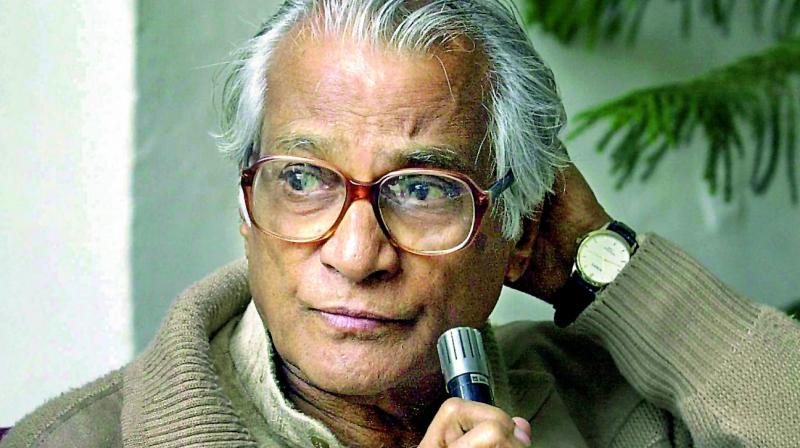Socialist George Fernandes passes away at 88
Jaya Jaitly, a long-time associate of Fernandes, said Fernandes had recently contracted swine flu.

New Delhi: George Fernandes, a lifelong socialist despite his political adventurism that included Cabinet posts in two ideological opposite governments where he ousted Coca-Cola in 1977 and oversaw the Kargil war in 1999, died on Tuesday.
He was 88. Fernandes, who had been suffering from Alzheimer’s disease for several years, died peacefully at his home and his body was taken to All India Institute of Medical Sciences for embalming, his wife, Leila Kabir Fernandes, said in a statement.
She said the last rites will be conducted soon “after our son, Sean Fernandes, arrives in India (from the US).
As soon as Sean arrives we will finalize the timing of the last rites and will inform all.”
Jaya Jaitly, a long-time associate of Fernandes, said Fernandes had recently contracted swine flu. “I used to meet him regularly and I was to meet him tomorrow as well. But, such is life,” she said.
A call was received at a private hospital from his home and an ambulance was dispatched although doctors had declared
him dead at his home already, hospital sources said.
“Fernandes was attended to at his home by a Max Healthcare team, which found him unresponsive and declared him dead at 06:42 AM today,” the hospital said in a statement.
Fernandes, who was born to a Christian family in Mangalore, Karnataka, burst into national limelight when as a firebrand trade unionist in Mumbai he organised a Railways strike in 1974 that brought the country to a standstill.
Ironically, he became the Railways minister in 1989 under V.P. Singh’s National Front coalition government, comprising mostly Left leaning parties.
1930 - 2019: Remembering the rebel leader
As a young man training to become a Catholic priest, he found it offensive that rectors at his seminary got better food than the students. This desire to fight for justice became the defining quality of George Fernandes, one of India’s most firebrand union leaders who remained a socialist activist even in his several stints as Union minister.
Fernandes epitomised irony — as union leader he organised India’s biggest railway strikes and later became railway minister; despite his socialist ideology, he became industry minister; harbouring a deep distrust for the RSS he allied with the BJP.
All his life he had a reputation for incorruptibility, yet he had to resign as defence minister over an oblique corruption charge against his close aide.
Born in Mangalore, Karnataka to a Chris-tian family on June 3, 1930, Fernandes was truly a pan-Indian leader who rose above identity politics — he left the seminary at 19, went on to become a union leader in Mumbai, was a member of Parliament from South Bombay and for many terms MP from Muzzafarpur and Nalanda in Bihar, and spoke English, Hindi, Kannada, Konkani and Marathi fluently.
“We have lost a leader who was a fighter and dedicated his life to the cause of workers, labourers and common people of India,” said NCP president Sharad Pawar, who shared a deep personal bond with Fernandes despite their political differences. Fernandes is best remembered as the union leader who led the famous all-India railways strike in 1974 that brought the country to a standstill.
As industry minister he forced Coca-Cola and IBM to leave India in 1977 and as defence minister he oversaw the Kargil war in 1999 and the Pokharan nuclear test in 1998.
Usually dressed in a crumpled kurta pajama and slippers, the unpretentious Fernandes made no attempt to change his attire even while holding high offices.
He had a deep empathy for soldiers, and as defence minister visited Siachen more than 30 times, often taking cake to distribute among jawans during Christmas. Fernandes also changed the defe-nce narrative, shifting focus from Pakistan as the traditional enemy, when he described China as India’s “Enemy No. 1”.

